Analysis of Issues and Decision in Discrimination Case for Same-Sex Marriage Services
VerifiedAdded on 2023/06/12
|5
|1250
|360
AI Summary
This article analyzes the issues and decision in a discrimination case for same-sex marriage services. It discusses the scope of fundamental freedoms and equality rights under the Canadian Charter of Rights and Freedoms, as well as the balance between religious beliefs and non-discriminating rights. The decision orders the reinstatement of the marriage commissioner and compensation for the respondents.
Contribute Materials
Your contribution can guide someone’s learning journey. Share your
documents today.
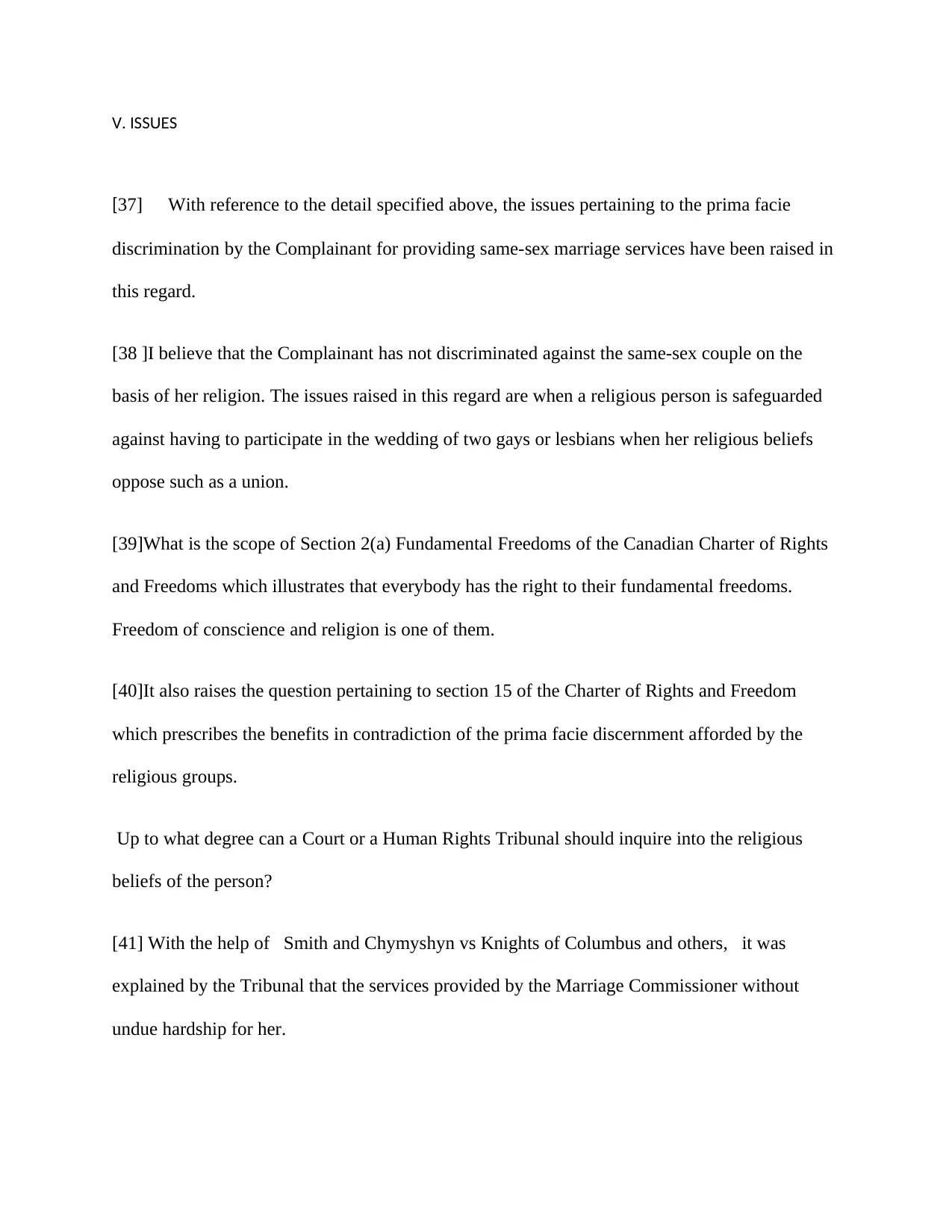
V. ISSUES
[37] With reference to the detail specified above, the issues pertaining to the prima facie
discrimination by the Complainant for providing same-sex marriage services have been raised in
this regard.
[38 ]I believe that the Complainant has not discriminated against the same-sex couple on the
basis of her religion. The issues raised in this regard are when a religious person is safeguarded
against having to participate in the wedding of two gays or lesbians when her religious beliefs
oppose such as a union.
[39]What is the scope of Section 2(a) Fundamental Freedoms of the Canadian Charter of Rights
and Freedoms which illustrates that everybody has the right to their fundamental freedoms.
Freedom of conscience and religion is one of them.
[40]It also raises the question pertaining to section 15 of the Charter of Rights and Freedom
which prescribes the benefits in contradiction of the prima facie discernment afforded by the
religious groups.
Up to what degree can a Court or a Human Rights Tribunal should inquire into the religious
beliefs of the person?
[41] With the help of Smith and Chymyshyn vs Knights of Columbus and others, it was
explained by the Tribunal that the services provided by the Marriage Commissioner without
undue hardship for her.
[37] With reference to the detail specified above, the issues pertaining to the prima facie
discrimination by the Complainant for providing same-sex marriage services have been raised in
this regard.
[38 ]I believe that the Complainant has not discriminated against the same-sex couple on the
basis of her religion. The issues raised in this regard are when a religious person is safeguarded
against having to participate in the wedding of two gays or lesbians when her religious beliefs
oppose such as a union.
[39]What is the scope of Section 2(a) Fundamental Freedoms of the Canadian Charter of Rights
and Freedoms which illustrates that everybody has the right to their fundamental freedoms.
Freedom of conscience and religion is one of them.
[40]It also raises the question pertaining to section 15 of the Charter of Rights and Freedom
which prescribes the benefits in contradiction of the prima facie discernment afforded by the
religious groups.
Up to what degree can a Court or a Human Rights Tribunal should inquire into the religious
beliefs of the person?
[41] With the help of Smith and Chymyshyn vs Knights of Columbus and others, it was
explained by the Tribunal that the services provided by the Marriage Commissioner without
undue hardship for her.
Secure Best Marks with AI Grader
Need help grading? Try our AI Grader for instant feedback on your assignments.
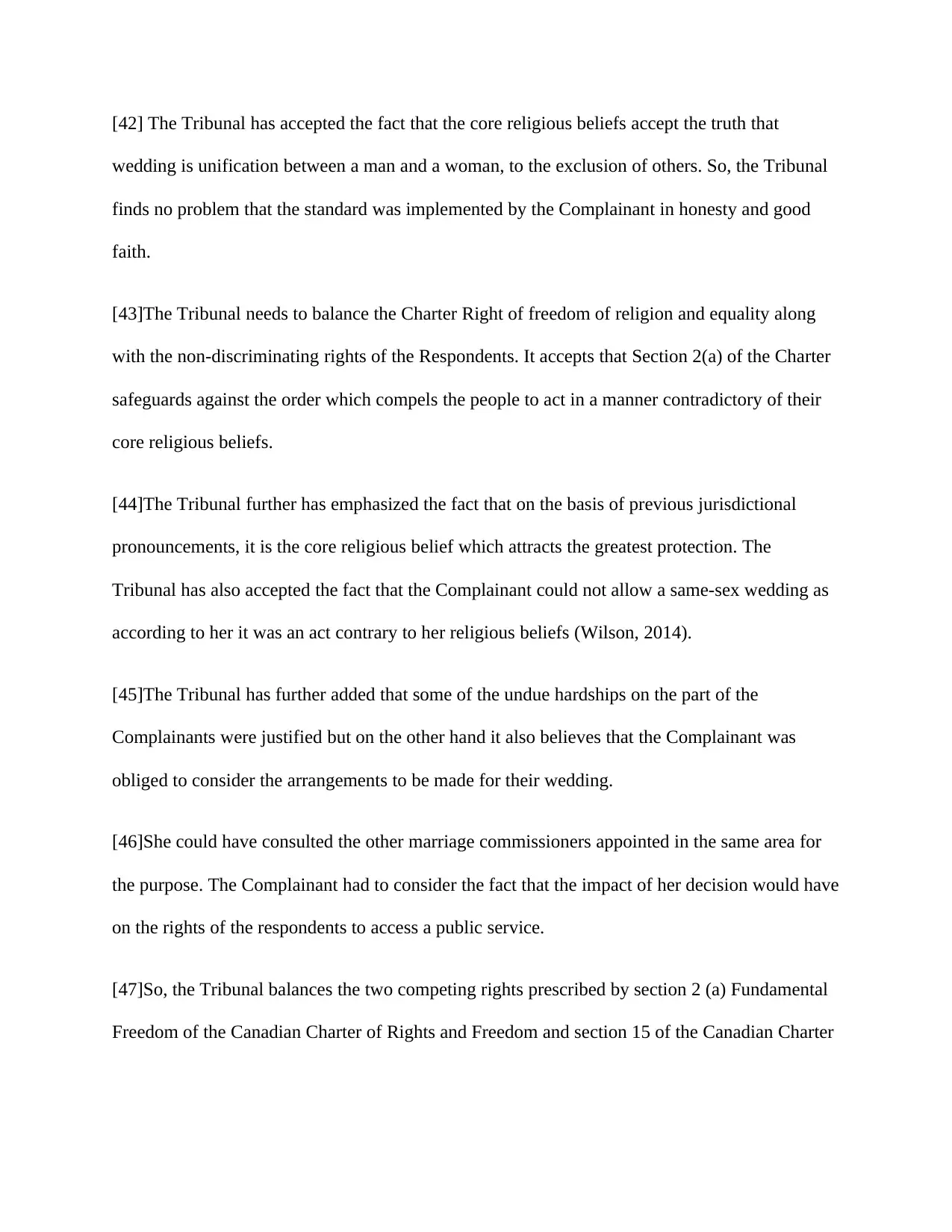
[42] The Tribunal has accepted the fact that the core religious beliefs accept the truth that
wedding is unification between a man and a woman, to the exclusion of others. So, the Tribunal
finds no problem that the standard was implemented by the Complainant in honesty and good
faith.
[43]The Tribunal needs to balance the Charter Right of freedom of religion and equality along
with the non-discriminating rights of the Respondents. It accepts that Section 2(a) of the Charter
safeguards against the order which compels the people to act in a manner contradictory of their
core religious beliefs.
[44]The Tribunal further has emphasized the fact that on the basis of previous jurisdictional
pronouncements, it is the core religious belief which attracts the greatest protection. The
Tribunal has also accepted the fact that the Complainant could not allow a same-sex wedding as
according to her it was an act contrary to her religious beliefs (Wilson, 2014).
[45]The Tribunal has further added that some of the undue hardships on the part of the
Complainants were justified but on the other hand it also believes that the Complainant was
obliged to consider the arrangements to be made for their wedding.
[46]She could have consulted the other marriage commissioners appointed in the same area for
the purpose. The Complainant had to consider the fact that the impact of her decision would have
on the rights of the respondents to access a public service.
[47]So, the Tribunal balances the two competing rights prescribed by section 2 (a) Fundamental
Freedom of the Canadian Charter of Rights and Freedom and section 15 of the Canadian Charter
wedding is unification between a man and a woman, to the exclusion of others. So, the Tribunal
finds no problem that the standard was implemented by the Complainant in honesty and good
faith.
[43]The Tribunal needs to balance the Charter Right of freedom of religion and equality along
with the non-discriminating rights of the Respondents. It accepts that Section 2(a) of the Charter
safeguards against the order which compels the people to act in a manner contradictory of their
core religious beliefs.
[44]The Tribunal further has emphasized the fact that on the basis of previous jurisdictional
pronouncements, it is the core religious belief which attracts the greatest protection. The
Tribunal has also accepted the fact that the Complainant could not allow a same-sex wedding as
according to her it was an act contrary to her religious beliefs (Wilson, 2014).
[45]The Tribunal has further added that some of the undue hardships on the part of the
Complainants were justified but on the other hand it also believes that the Complainant was
obliged to consider the arrangements to be made for their wedding.
[46]She could have consulted the other marriage commissioners appointed in the same area for
the purpose. The Complainant had to consider the fact that the impact of her decision would have
on the rights of the respondents to access a public service.
[47]So, the Tribunal balances the two competing rights prescribed by section 2 (a) Fundamental
Freedom of the Canadian Charter of Rights and Freedom and section 15 of the Canadian Charter
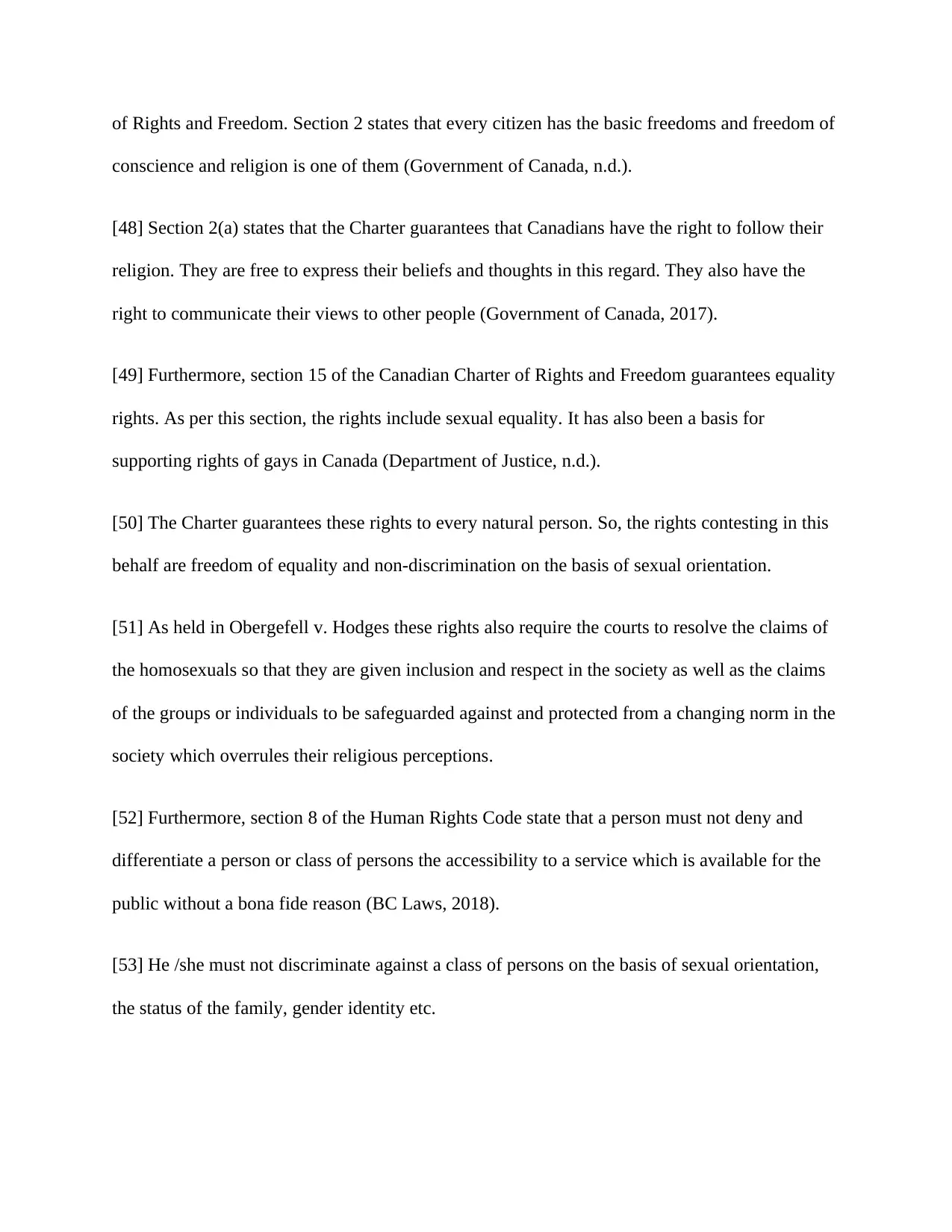
of Rights and Freedom. Section 2 states that every citizen has the basic freedoms and freedom of
conscience and religion is one of them (Government of Canada, n.d.).
[48] Section 2(a) states that the Charter guarantees that Canadians have the right to follow their
religion. They are free to express their beliefs and thoughts in this regard. They also have the
right to communicate their views to other people (Government of Canada, 2017).
[49] Furthermore, section 15 of the Canadian Charter of Rights and Freedom guarantees equality
rights. As per this section, the rights include sexual equality. It has also been a basis for
supporting rights of gays in Canada (Department of Justice, n.d.).
[50] The Charter guarantees these rights to every natural person. So, the rights contesting in this
behalf are freedom of equality and non-discrimination on the basis of sexual orientation.
[51] As held in Obergefell v. Hodges these rights also require the courts to resolve the claims of
the homosexuals so that they are given inclusion and respect in the society as well as the claims
of the groups or individuals to be safeguarded against and protected from a changing norm in the
society which overrules their religious perceptions.
[52] Furthermore, section 8 of the Human Rights Code state that a person must not deny and
differentiate a person or class of persons the accessibility to a service which is available for the
public without a bona fide reason (BC Laws, 2018).
[53] He /she must not discriminate against a class of persons on the basis of sexual orientation,
the status of the family, gender identity etc.
conscience and religion is one of them (Government of Canada, n.d.).
[48] Section 2(a) states that the Charter guarantees that Canadians have the right to follow their
religion. They are free to express their beliefs and thoughts in this regard. They also have the
right to communicate their views to other people (Government of Canada, 2017).
[49] Furthermore, section 15 of the Canadian Charter of Rights and Freedom guarantees equality
rights. As per this section, the rights include sexual equality. It has also been a basis for
supporting rights of gays in Canada (Department of Justice, n.d.).
[50] The Charter guarantees these rights to every natural person. So, the rights contesting in this
behalf are freedom of equality and non-discrimination on the basis of sexual orientation.
[51] As held in Obergefell v. Hodges these rights also require the courts to resolve the claims of
the homosexuals so that they are given inclusion and respect in the society as well as the claims
of the groups or individuals to be safeguarded against and protected from a changing norm in the
society which overrules their religious perceptions.
[52] Furthermore, section 8 of the Human Rights Code state that a person must not deny and
differentiate a person or class of persons the accessibility to a service which is available for the
public without a bona fide reason (BC Laws, 2018).
[53] He /she must not discriminate against a class of persons on the basis of sexual orientation,
the status of the family, gender identity etc.
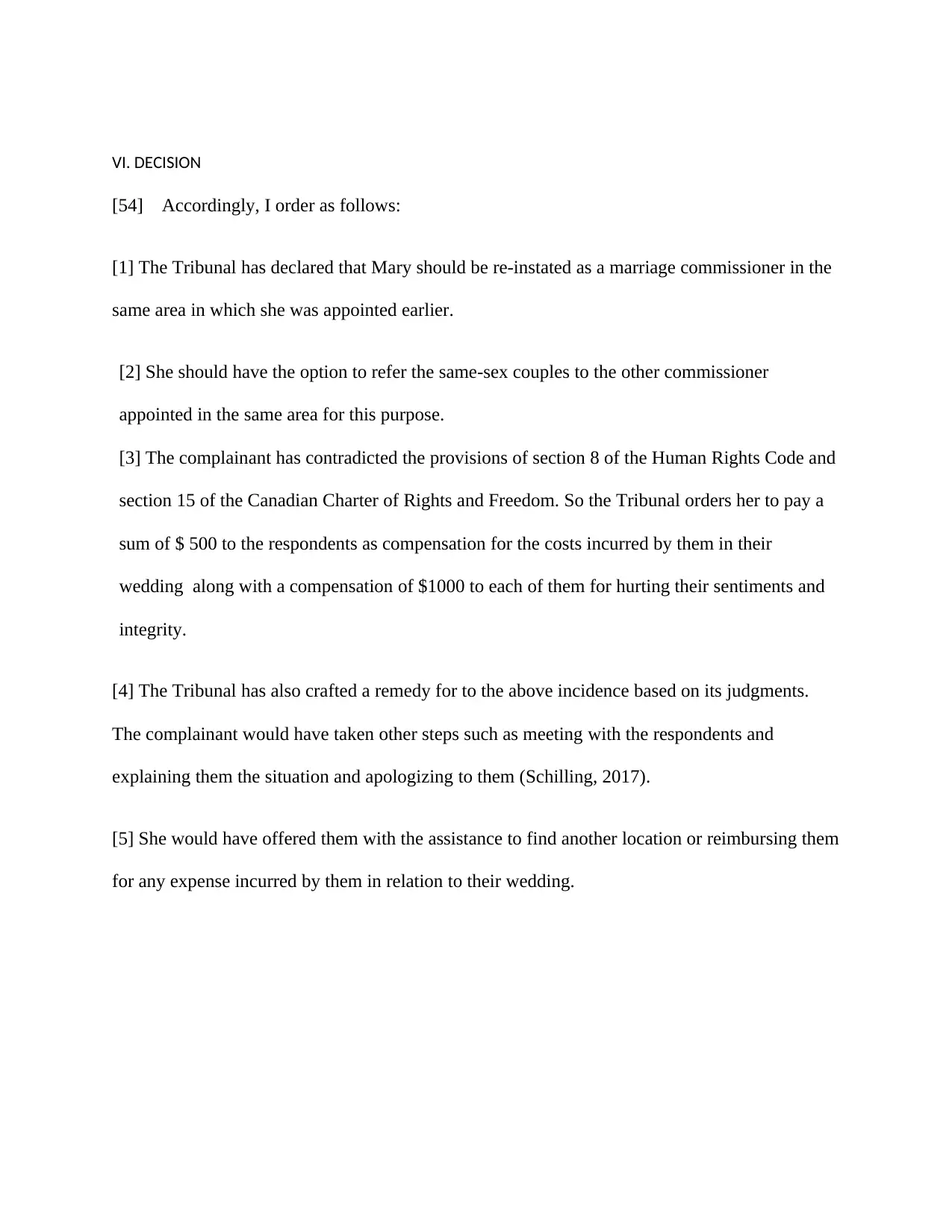
VI. DECISION
[54] Accordingly, I order as follows:
[1] The Tribunal has declared that Mary should be re-instated as a marriage commissioner in the
same area in which she was appointed earlier.
[2] She should have the option to refer the same-sex couples to the other commissioner
appointed in the same area for this purpose.
[3] The complainant has contradicted the provisions of section 8 of the Human Rights Code and
section 15 of the Canadian Charter of Rights and Freedom. So the Tribunal orders her to pay a
sum of $ 500 to the respondents as compensation for the costs incurred by them in their
wedding along with a compensation of $1000 to each of them for hurting their sentiments and
integrity.
[4] The Tribunal has also crafted a remedy for to the above incidence based on its judgments.
The complainant would have taken other steps such as meeting with the respondents and
explaining them the situation and apologizing to them (Schilling, 2017).
[5] She would have offered them with the assistance to find another location or reimbursing them
for any expense incurred by them in relation to their wedding.
[54] Accordingly, I order as follows:
[1] The Tribunal has declared that Mary should be re-instated as a marriage commissioner in the
same area in which she was appointed earlier.
[2] She should have the option to refer the same-sex couples to the other commissioner
appointed in the same area for this purpose.
[3] The complainant has contradicted the provisions of section 8 of the Human Rights Code and
section 15 of the Canadian Charter of Rights and Freedom. So the Tribunal orders her to pay a
sum of $ 500 to the respondents as compensation for the costs incurred by them in their
wedding along with a compensation of $1000 to each of them for hurting their sentiments and
integrity.
[4] The Tribunal has also crafted a remedy for to the above incidence based on its judgments.
The complainant would have taken other steps such as meeting with the respondents and
explaining them the situation and apologizing to them (Schilling, 2017).
[5] She would have offered them with the assistance to find another location or reimbursing them
for any expense incurred by them in relation to their wedding.
Secure Best Marks with AI Grader
Need help grading? Try our AI Grader for instant feedback on your assignments.
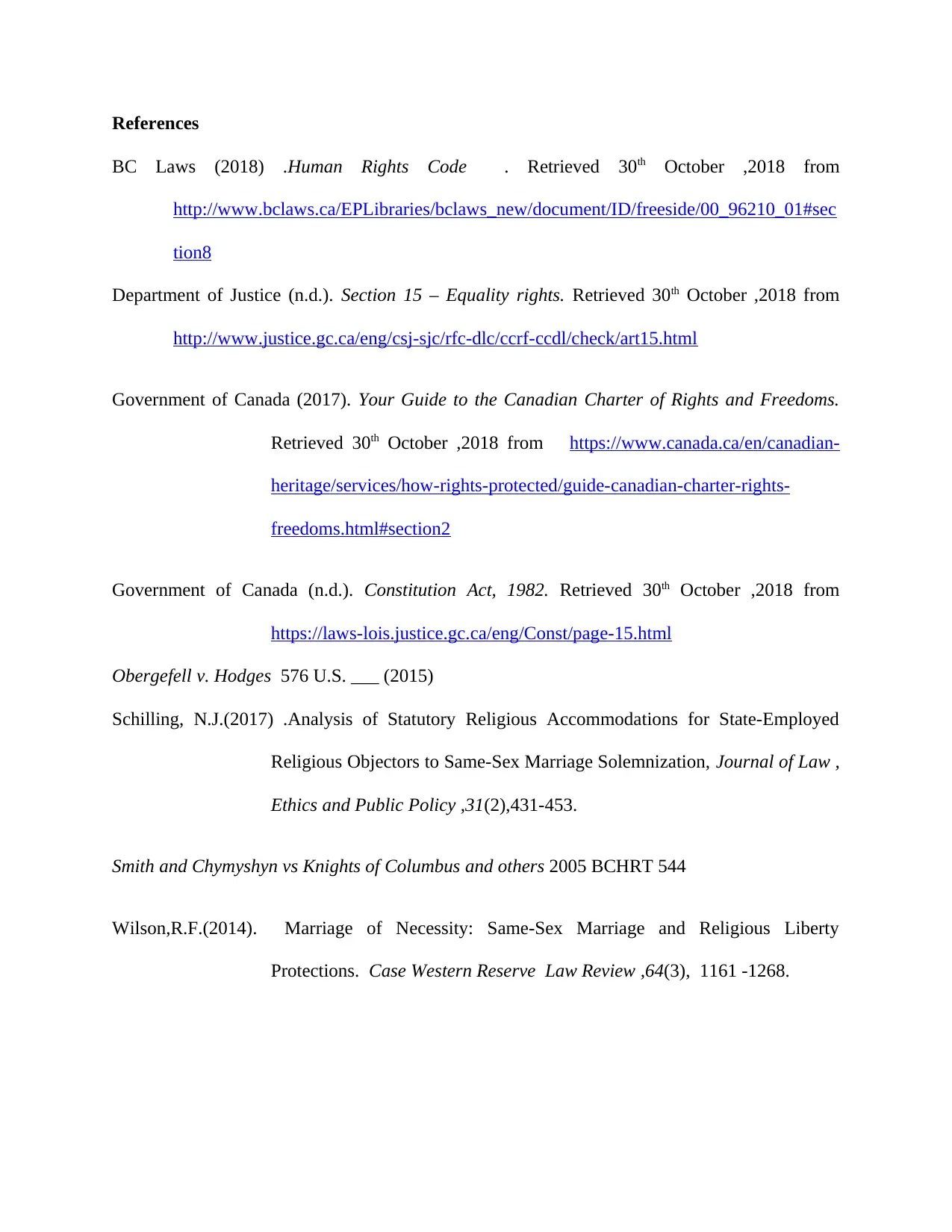
References
BC Laws (2018) .Human Rights Code . Retrieved 30th October ,2018 from
http://www.bclaws.ca/EPLibraries/bclaws_new/document/ID/freeside/00_96210_01#sec
tion8
Department of Justice (n.d.). Section 15 – Equality rights. Retrieved 30th October ,2018 from
http://www.justice.gc.ca/eng/csj-sjc/rfc-dlc/ccrf-ccdl/check/art15.html
Government of Canada (2017). Your Guide to the Canadian Charter of Rights and Freedoms.
Retrieved 30th October ,2018 from https://www.canada.ca/en/canadian-
heritage/services/how-rights-protected/guide-canadian-charter-rights-
freedoms.html#section2
Government of Canada (n.d.). Constitution Act, 1982. Retrieved 30th October ,2018 from
https://laws-lois.justice.gc.ca/eng/Const/page-15.html
Obergefell v. Hodges 576 U.S. ___ (2015)
Schilling, N.J.(2017) .Analysis of Statutory Religious Accommodations for State-Employed
Religious Objectors to Same-Sex Marriage Solemnization, Journal of Law ,
Ethics and Public Policy ,31(2),431-453.
Smith and Chymyshyn vs Knights of Columbus and others 2005 BCHRT 544
Wilson,R.F.(2014). Marriage of Necessity: Same-Sex Marriage and Religious Liberty
Protections. Case Western Reserve Law Review ,64(3), 1161 -1268.
BC Laws (2018) .Human Rights Code . Retrieved 30th October ,2018 from
http://www.bclaws.ca/EPLibraries/bclaws_new/document/ID/freeside/00_96210_01#sec
tion8
Department of Justice (n.d.). Section 15 – Equality rights. Retrieved 30th October ,2018 from
http://www.justice.gc.ca/eng/csj-sjc/rfc-dlc/ccrf-ccdl/check/art15.html
Government of Canada (2017). Your Guide to the Canadian Charter of Rights and Freedoms.
Retrieved 30th October ,2018 from https://www.canada.ca/en/canadian-
heritage/services/how-rights-protected/guide-canadian-charter-rights-
freedoms.html#section2
Government of Canada (n.d.). Constitution Act, 1982. Retrieved 30th October ,2018 from
https://laws-lois.justice.gc.ca/eng/Const/page-15.html
Obergefell v. Hodges 576 U.S. ___ (2015)
Schilling, N.J.(2017) .Analysis of Statutory Religious Accommodations for State-Employed
Religious Objectors to Same-Sex Marriage Solemnization, Journal of Law ,
Ethics and Public Policy ,31(2),431-453.
Smith and Chymyshyn vs Knights of Columbus and others 2005 BCHRT 544
Wilson,R.F.(2014). Marriage of Necessity: Same-Sex Marriage and Religious Liberty
Protections. Case Western Reserve Law Review ,64(3), 1161 -1268.
1 out of 5
Your All-in-One AI-Powered Toolkit for Academic Success.
+13062052269
info@desklib.com
Available 24*7 on WhatsApp / Email
![[object Object]](/_next/static/media/star-bottom.7253800d.svg)
Unlock your academic potential
© 2024 | Zucol Services PVT LTD | All rights reserved.
